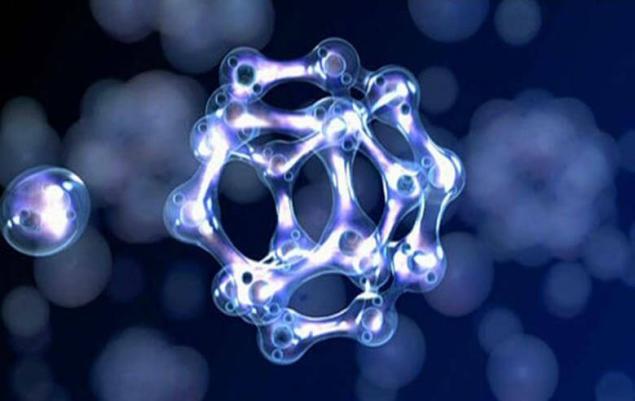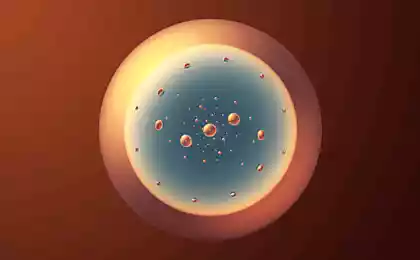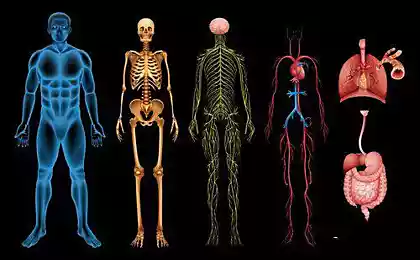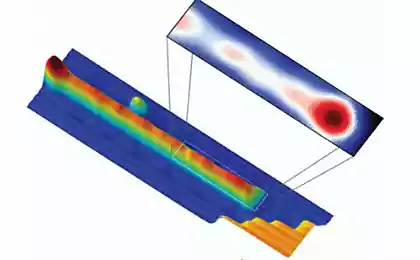584
Physics of elementary particles of your body
14 billion years ago when hot and dense point that was our universe rapidly expanded, all matter and antimatter that existed in those days, was to be destroyed and leave us nothing but energy. But some matter survived.
Now we live in a world full of particles. Not any particles, whose masses and charges necessary for the existence of human life. We will now give some facts about particle physics that will make your electrons to jump.

The particles that we're made of
About 99% of your body consists of atoms of hydrogen, carbon, nitrogen and oxygen. Also, you are other essential for life, but in much smaller proportions.
While most of the cells in your body regenerate every 7-15 years, many of the particles that make up your cells have been in existence for millions of years. Your hydrogen atoms formed during the Big Bang, the atoms of carbon, nitrogen and oxygen occurred during the birth of stars. The heaviest elements contained in your body appeared during supernova explosions.
The size of the atom depends on how their electrons. - Inside the atom, is approximately 100,000 times less than on the item itself. If the nucleus were the size of a peanut, the atom would be the size of a basketball court. If the atom to remove the free space that we could fit in a particle of lead dust, and the entire human race could fit in a sugar cube.
As you can guess, these foreign particles constitute only the smallest part of your body weight. Each proton and neutron inside the nucleus of an atom consists of three quarks. The mass of the quarks, which is due to their interaction with the Higgs field, is only a few percent of the mass of a proton or neutron. The carriers of the strong nuclear interactions holding the quarks together, gluons and completely weightless.
But if your body weight is not the mass of these particles, then where does it come from? The answer: energy. Almost all of the weight of the human body consists of the kinetic energy of the quarks and the energy of the gluons.
Particles that we produce
Your body is a small Deposit of radioactive elements. Every year you get a dose of natural radiation value in the 40 millibar that is inside of you. The same amount of radiation you receive during the four radiographs of the chest. The radiation level in your body may increase by 1-2 millibar every 8 hours if you sleep near your same radioactive a loved one.
You emit radiation because the food and drinks you consume and even the air you breathe contain radionuclides such as potassium-40 and carbon-14. They interact with the molecules of your body, decay and produce radiation in your body.
When Potassium-40 decays, it emits a positron – the antiparticle of the electron. Thus, your body contains a small amount of antimatter. On average, each person emits over 4000 positrons in the day – about 180 positrons per hour. But soon these positrons collide with your electron and converted into radiation in the form of gamma rays.
The particles we encounter
The radioactivity in your body – is only part of the radiation which you face each day without getting harm. The average American receives a dose of radiation equal to 620 millibar per year. The food you consume, the house in which you live, the stones and the soil on which you walk, supply you with low levels of radiation. If you just eat a Brazil nut or go to the dentist, you will receive a level of radiation in several millibar. Smoking can increase the level of radiation at 16,000 millibar.
Cosmic radiation is radiation with extraterrestrial source that continuously penetrates our atmosphere. In our atmosphere it collides with other nuclei produces mesons, many of which disintegrate into particles such as muons and neutrinos. These particles in turn fall to the surface of the Earth and penetrate into your body at a rate of approximately 10 atoms per second. They add approximately 27 millibar to your annual radiation dose. These cosmic particles can sometimes break your genetics and provoke the emergence of small mutations, thereby contributing to evolution.
In addition, that is constantly bombarding you with photons, creating the appearance of the world around you, the Sun attacks you and particles called neutrinos. Neutrinos are permanent guests of your body, penetrating you in the amount of 100 trillion per second. The sun is not the only source of neutrinos; these particles also come from other sources – for example, from nuclear reactions to other stars and even nuclear reactions on our own planet.
A neutrino is formed in the first few seconds after the Big Bang. And they are older than even your own atoms. Neutrinos very weakly interact with other particles, and therefore visits your body do not carry virtually no consequences.
Most likely, your body constantly interacts with dark matter particles. Dark matter does not emit, reflect or absorb light and therefore very difficult to detect. However, scientists believe that dark matter makes up about 80% of all matter in the Universe.
Given such a large amount of dark matter contained in the Universe, scientists have calculated that hundreds of thousands of these particles interact with your body every second. They are faced with your atoms every minute. But dark matter does not strongly interact with matter from where you are, and therefore the effects of this interaction is likely imperceptible.
The next time you are interested in how particle physics impacts your life, just look inside your own body. published
P. S. And remember, only by changing their consumption — together we change the world! ©
Source: vk.com/etorabotaet?w=wall-37160097_46959
Now we live in a world full of particles. Not any particles, whose masses and charges necessary for the existence of human life. We will now give some facts about particle physics that will make your electrons to jump.

The particles that we're made of
About 99% of your body consists of atoms of hydrogen, carbon, nitrogen and oxygen. Also, you are other essential for life, but in much smaller proportions.
While most of the cells in your body regenerate every 7-15 years, many of the particles that make up your cells have been in existence for millions of years. Your hydrogen atoms formed during the Big Bang, the atoms of carbon, nitrogen and oxygen occurred during the birth of stars. The heaviest elements contained in your body appeared during supernova explosions.
The size of the atom depends on how their electrons. - Inside the atom, is approximately 100,000 times less than on the item itself. If the nucleus were the size of a peanut, the atom would be the size of a basketball court. If the atom to remove the free space that we could fit in a particle of lead dust, and the entire human race could fit in a sugar cube.
As you can guess, these foreign particles constitute only the smallest part of your body weight. Each proton and neutron inside the nucleus of an atom consists of three quarks. The mass of the quarks, which is due to their interaction with the Higgs field, is only a few percent of the mass of a proton or neutron. The carriers of the strong nuclear interactions holding the quarks together, gluons and completely weightless.
But if your body weight is not the mass of these particles, then where does it come from? The answer: energy. Almost all of the weight of the human body consists of the kinetic energy of the quarks and the energy of the gluons.
Particles that we produce
Your body is a small Deposit of radioactive elements. Every year you get a dose of natural radiation value in the 40 millibar that is inside of you. The same amount of radiation you receive during the four radiographs of the chest. The radiation level in your body may increase by 1-2 millibar every 8 hours if you sleep near your same radioactive a loved one.
You emit radiation because the food and drinks you consume and even the air you breathe contain radionuclides such as potassium-40 and carbon-14. They interact with the molecules of your body, decay and produce radiation in your body.
When Potassium-40 decays, it emits a positron – the antiparticle of the electron. Thus, your body contains a small amount of antimatter. On average, each person emits over 4000 positrons in the day – about 180 positrons per hour. But soon these positrons collide with your electron and converted into radiation in the form of gamma rays.
The particles we encounter
The radioactivity in your body – is only part of the radiation which you face each day without getting harm. The average American receives a dose of radiation equal to 620 millibar per year. The food you consume, the house in which you live, the stones and the soil on which you walk, supply you with low levels of radiation. If you just eat a Brazil nut or go to the dentist, you will receive a level of radiation in several millibar. Smoking can increase the level of radiation at 16,000 millibar.
Cosmic radiation is radiation with extraterrestrial source that continuously penetrates our atmosphere. In our atmosphere it collides with other nuclei produces mesons, many of which disintegrate into particles such as muons and neutrinos. These particles in turn fall to the surface of the Earth and penetrate into your body at a rate of approximately 10 atoms per second. They add approximately 27 millibar to your annual radiation dose. These cosmic particles can sometimes break your genetics and provoke the emergence of small mutations, thereby contributing to evolution.
In addition, that is constantly bombarding you with photons, creating the appearance of the world around you, the Sun attacks you and particles called neutrinos. Neutrinos are permanent guests of your body, penetrating you in the amount of 100 trillion per second. The sun is not the only source of neutrinos; these particles also come from other sources – for example, from nuclear reactions to other stars and even nuclear reactions on our own planet.
A neutrino is formed in the first few seconds after the Big Bang. And they are older than even your own atoms. Neutrinos very weakly interact with other particles, and therefore visits your body do not carry virtually no consequences.
Most likely, your body constantly interacts with dark matter particles. Dark matter does not emit, reflect or absorb light and therefore very difficult to detect. However, scientists believe that dark matter makes up about 80% of all matter in the Universe.
Given such a large amount of dark matter contained in the Universe, scientists have calculated that hundreds of thousands of these particles interact with your body every second. They are faced with your atoms every minute. But dark matter does not strongly interact with matter from where you are, and therefore the effects of this interaction is likely imperceptible.
The next time you are interested in how particle physics impacts your life, just look inside your own body. published
P. S. And remember, only by changing their consumption — together we change the world! ©
Source: vk.com/etorabotaet?w=wall-37160097_46959
Therapeutic infusions to improve blood circulation in the legs
Julio Granel': Psychoanalytic theory of accidents























